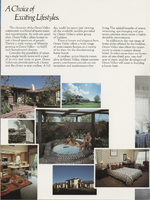Search the Special Collections and Archives Portal
Search Results
Roy and Lucina Waite oral history interview
Identifier
Abstract
Oral history interview with Roy and Lucina Waite conducted by Bernard Timberg on January 15, 1974 and January 30, 1974 for the Ralph Roske Oral History Project on Early Las Vegas. The Waites' discuss life in Las Vegas, Nevada when it was primarily a mining town, and how much the people, community, and environment changed as the population grew.
Archival Collection
University of Nevada, Las Vegas Women's Council Records
Identifier
Abstract
Records are comprised of the University of Nevada, Las Vegas (UNLV) Women’s Council memoranda, communications, newspaper clippings, and planning documents from 1993 to 2012. The collection includes information primarily about the Committee for an Inclusive and Just University (CIJU). The CIJU materials include planning documents for multiple surveys including: campus climate surveys, status of women, campus culture, and campus environment.
Archival Collection
Urban Chamber of Commerce of Las Vegas, Nevada Records
Identifier
Abstract
The Urban Chamber of Commerce of Las Vegas, Nevada Records date from approximately 1980 to 2009 and contains the organizational records of the Urban Chamber of Commerce of Las Vegas, Nevada (UCC), one of the many chambers of commerce in the Las Vegas, Nevada area. The mission of the Urban Chamber of Commerce is to create and foster an environment that promotes development of members and Black-owned businesses. The collection is comprised of publications, financial and administrative records, various event information, and photographs of events and membership.
Archival Collection
Willis Evans oral history interview
Identifier
Abstract
Oral history interview with Willis Evans conducted by Kathleen Morgan La Spina on December 02, 1986 for the Ralph Roske Oral History Project on Early Las Vegas. Evans discusses arriving and living in Las Vegas, Nevada. Evans also discusses being involved in the civic organization, District Attorney Youth Advisory Group. The interview concludes with a discussion of Boulder (Hoover) Dam, and changes in Las Vegas’ economy, politics, and environment.
Archival Collection
Digital files, 1999-2012, 2007-2012
Level of Description
Scope and Contents
The digital files subseries (1999-2012) primarily consists of documentation related to issues important to Shelley Berkley's constituents, including the economy, environment, security, education, housing, international relations, and the rights of under-represented communities. Files include supporting documents and talking points used for Congressional speeches, committee work, events, and interviews. Berkley's speeches are captured in textual documents as well as some video recordings of speeches she gave on the floor of Congress and in committees. Files also include correspondence to fellow members of Congress, other government officials, and constituents related to the issues documented in the series.
Archival Collection
Collection Name: Shelley Berkley Papers
Box/Folder: N/A
Archival Component
Betty Saunders oral history interview
Identifier
Abstract
Oral history interview with Betty Saunders conducted by an unnamed interviewer on an unknown date in approximately 1995 to 2005 for the UNLV University Libraries Oral History Collection. In this interview, Saunders discusses her career in the U.S. Air Force. She describes the environment and culture including living quarters, training, and promotions. Saunders talks about her experience as an African American woman in the military including how marriage and pregnancy affected her.
Archival Collection
Frank Johnson oral history interview
Identifier
Abstract
Oral history interview with Frank Johnson conducted by George Baker on February 21, 1980 for the Ralph Roske Oral History Project on Early Las Vegas. Johnson discusses his career as a journalist for the Nevada State Journal and how he transitioned into his position as a government official. Johnson then recalls problems that arose while he was chairman of the Nevada Gaming Commission. The interview concludes with Johnson speculating about the impact of industrial growth on the environment.
Archival Collection
James Stover oral history interview
Identifier
Abstract
Oral history interview with James Stover conducted by Robert Filmer on March 31, 1978 for the Ralph Roske Oral History Project on Early Las Vegas. In this interview, Stover discusses arriving to Las Vegas, Nevada in 1953 to work in construction. Stover then describes his most recent occupation, pest control, and describes the kind of work that goes into pest control. Stover later discusses problems with living in a desert and the difficulties of floods in a desert environment.
Archival Collection
Linda Hartley oral history interview
Identifier
Abstract
Oral history interview with Linda Hartley conducted by Pauline Marchese on March 10, 1978 for the Ralph Roske Oral History Project on Early Las Vegas. During the interview, the two discuss Hartley’s personal history, such as schools that she had attended and her recollection of local recreational activities. The two go on to talk about changes in crime, the environment, and briefly discuss a variety of issues at the time, including: segregated schools, prostitution, and effects of the Nevada Test Site.
Archival Collection

